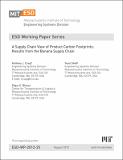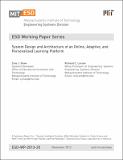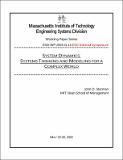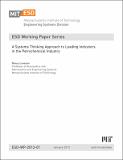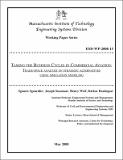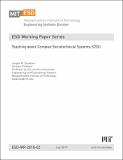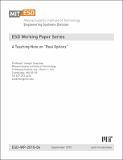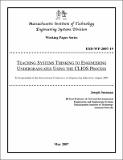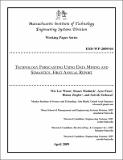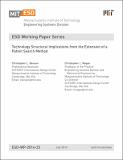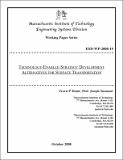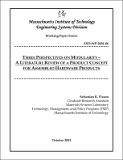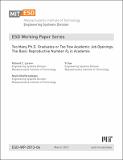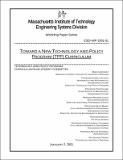Browsing Engineering Systems Division by Title
Now showing items 227-246 of 273
-
Superfund: An Assessment of Superfund Site Remedy Selectioin and Implementation
(Massachusetts Institute of Technology. Engineering Systems Division, 2007-01)Since its inception in 1980, the U.S. Environmental Protection Agency’s (EPA) Superfund Program has served as the primary mechanism for coordinating the remediation of sites contaminated with hazardous substances. Although ... -
Supply Chain Management Under The Threat Of International Terrorism
(Massachusetts Institute of Technology. Engineering Systems Division, 2002-05)On the morning of September 11th, 2001, the United States and the Western world entered into a new era – one in which large scale terrorist acts are to be expected. The impacts of the new era will challenge supply chain ... -
A Supply Chain View of Product Carbon Footprints: Results from the Banana Supply Chain
(Massachusetts Institute of Technology. Engineering Systems Division, 2012-08)Interest in the use of Life Cycle Assessment (LCA) to measure the carbon footprint of products has increased in recent years. While issues have been raised regarding the use of LCA to measure carbon footprints, the ... -
Survey Design to Unravel Freight Transportation Demand of Establishments in Cities
(Massachusetts Institute of Technology. Engineering Systems Division, 2015-05-22)Freight transportation serves the vital role of fulfilling the goods demand of residents in cities, yet little is known about the mechanisms that generate freight movements and their impact on traffic. Even though technology ... -
A Survey of Methods for Data Inclusion in System Dynamics Models
(Massachusetts Institute of Technology. Engineering Systems Division, 2014-05)In 1980, Jay Forrester enumerated three types of data needed to develop the structure and decision rules in models: numerical, written and mental data, in increasing order of importance. While this prioritization is ... -
Surviving and Thriving in the New World of Web Aggregators
(Massachusetts Institute of Technology. Engineering Systems Division, 2000-10)This paper examines the development of aggregators, entities that collect information from a wide range of sources, with or without prior arrangements, and add value through post-aggregation services. New Web-page extraction ... -
System Design and Architecture of an Online, Adaptive, and Personalized Learning Platform
(Massachusetts Institute of Technology. Engineering Systems Division, 2013-11)The authors propose that personalized learning can be brought to traditional and nontraditional learners through a new type of asynchronous learning platform called Guided Learning Pathways (GLP). The GLP platform allows ... -
System Dynamics: Systems Thinking and Modeling for a Complex World
(Massachusetts Institute of Technology. Engineering Systems Division, 2002-05)Todays problems often arise as unintended consequences of yesterdays solutions. Social systems often suffer from policy resistance, the tendency for well-intentioned interventions to be defeated by the response of the ... -
A Systems Framework for Assessing Air Quality Impacts of ITS: Application to Mexico City
(Massachusetts Institute of Technology. Engineering Systems Division, 2004-10)Intelligent Transportation Systems (ITS)—the application of communications and information technology to surface transportation systems—has the potential to improve transportation along several dimensions, from safety to ... -
A Systems Thinking Approach to Leading Indicators in the Petrochemical Industry
(Massachusetts Institute of Technology. Engineering Systems Division, 2013-01)There are always warning signs before a major accident, but these signs may only be noticeable or interpretable as a leading indicator in hindsight. Before an accident, such “weak signals” are often perceived only as noise. ... -
Taming the Business Cycles in Commercial Aviation: Trade-space analysis of strategic alternatives using simulation modeling
(Massachusetts Institute of Technology. Engineering Systems Division, 2008-05)We investigate the effectiveness of strategic alternatives that are designed to dampen the cyclicality manifest in the commercial aviation related industries. The constituent enterprises of the commercial aviation system ... -
Teaching about Complex Sociotechnical Systems (CSS)
(Massachusetts Institute of Technology. Engineering Systems Division, 2010-07)Prof Chris Magee and I teach the doctoral seminar in engineering systems (ESD.83) required for all ESD doctoral students usually in the first semester they are registered as doctoral students. One of the assignments deals ... -
A Teaching Note on “Real Options”
(Massachusetts Institute of Technology. Engineering Systems Division, 2010-09)The engineering life is uncertain. We often need to make decisions now that we hope will be effective some years from now. One approach to this conundrum is to design “flexibility” into our projects, hedging against future ... -
Teaching Systems Thinking to Engineering Undergraduates Using the CLIOS Process
(Massachusetts Institute of Technology. Engineering Systems Division, 2007-05)The introductory science courses taken by engineering undergraduates are usually intensely reductionist in form, silos in physics, chemistry, biology, and so forth. Then, their engineering subjects in the early undergraduate ... -
Technology Forecasting Using Data Mining and Semantics: First Annual Report
(Massachusetts Institute of Technology. Engineering Systems Division, 2009-04)The planning and management of research and development is a challenging process which is compounded by the large amounts of information which is available. The goal of this project is to mine science and technology databases ... -
Technology Structural Implications from the Extension of a Patent Search Method
(Massachusetts Institute of Technology. Engineering Systems Division, 2014-07)Many areas of academic and industrial work make use of the notion of a ‘technology’. This paper attempts to reduce the ambiguity around the definition of what constitutes a ‘technology’ by extension of a method described ... -
Technology-Enabled Strategy Development Alternatives for Surface Transportation
(Massachusetts Institute of Technology. Engineering Systems Division, 2008-10)This paper examines strategy development processes in surface transportation systems. In the U.S., transportation organizations typically develop strategy through a formal planning process; however, planning is not the ... -
Three Perspectives on Modularity – A Literature Review of a Product Concept for Assembled Hardware Products
(Massachusetts Institute of Technology. Engineering Systems Division, 2001-10)In recent years, modularity as a design strategy has received renewed interest. The term modularity, however, is often used to describe phenomena that are similar yet slightly different, for different products, and in ... -
Too Many Ph.D. Graduates or Too Few Academic Job Openings: The Basic Reproductive Number R[subscript 0] in Academia
(Massachusetts Institute of Technology. Engineering Systems Division, 2013-03)The academic job market has become increasingly competitive for Ph.D. graduates. In this Note we ask the basic question of “Are we producing more Ph.D.’s than needed?” We take a systems approach and offer a “birth rate” ... -
Toward a New Technology and Policy Program (TPP) Curriculum
(Massachusetts Institute of Technology. Engineering Systems Division, 2001-01)The mission of the MIT Technology and Policy Program (TPP) is: “Provide an integrative education to scientists and engineers who wish to lead in the development and implementation of responsible strategies and policies ...


